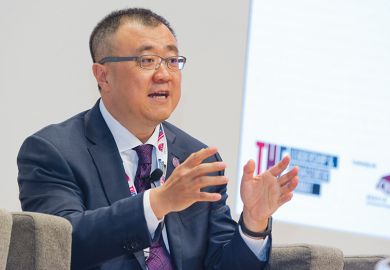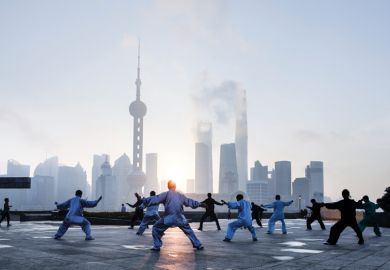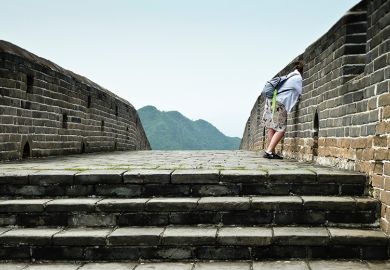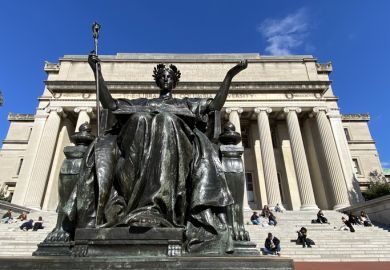China’s aspiration to be a science superpower is being thwarted by intensifying Communist Party control over universities, as funding decisions are placed in the hands of bureaucrats and academics’ fortunes are determined by their personal politics, a study says.
Australian National University political scientist Andy Kennedy said that China had made extraordinary improvements in its research performance, with its Nature Index score almost doubling in six years on the back of two decades of 20-plus per cent annual increases in basic research spending.
China has built some of the world’s fastest supercomputers, constructed the world’s biggest radio telescope and launched the world’s first quantum communications satellite, among many other achievements. It has moved to improve its research system by consolidating uncoordinated funding schemes, boosting performance monitoring and giving academia and industry an advisory voice on national research strategy.
It has also moved to overcome shortcomings such as short funding timetables that discourage risk-taking and foster misconduct such as plagiarism, fraud and faked peer review.
But the reforms have been hamstrung by bureaucracy, while internet censorship and an overbearing Communist Party are undermining China’s goal of constructing one of the world’s best university systems by 2050, according to Dr Kennedy.
In a forthcoming paper, Dr Kennedy says that mounting authoritarianism risks prioritising ideology over science and blunting efforts to bring top Chinese-born researchers back home.
One example is last year’s takeover of the National Natural Science Foundation of China, an independent funding foundation, by the Ministry of Science and Technology. “It has raised concerns that the autonomy the NSFC has enjoyed will be circumscribed,” said Dr Kennedy, an associate professor at ANU’s Crawford School of Public Policy.
The change was reportedly described by a Peking University physics professor as “like asking a pedestrian who has never had their hands on a steering wheel to drive a car along a massive highway”.
Dr Kennedy says that a clampdown on foreign websites has stifled internet speed and triggered complaints that scientists cannot access vital information. When a senior official recommended more targeted censorship that avoided important research sites, his comments were deleted from Chinese news portals – leading to a claim that anti-censorship proposals had themselves been censored.
And while the party’s power over university leadership appointments was demonstrated in last year’s ousting of Peking University president Lin Jianhua, Dr Kennedy says party influence runs deep in academia. He cites the establishment of “teachers’ affairs” departments at prominent universities such as Peking to monitor academics’ ideology and political attitudes.
“To the extent that ideology becomes a criterion in hiring and promotion, you’re not looking at academic excellence,” he said.
In a December 2016 speech, Tsinghua University party secretary Chen Xu said that academics’ political stances would be given top priority in their performance evaluations. Particular emphasis would be placed on “strengthening the ideological and political work of young teachers”, especially those returning from overseas.
The party committee will “regularly report and judge the ideological and political status of young teachers” and “build a party branch battle fortress”, according to a translation of Tsinghua’s summary of Dr Chen’s presentation.
Her remarks followed a widely reported speech by Chinese president Xi Jinping that called for universities to be “strongholds” of party leadership and teachers to be “staunch supporters” of the party. His speech in turn followed 2015 efforts by arms of the Communist Party to impose stricter political discipline and control in academia by “forcefully raising the ideological and political quality of higher education teaching teams”, according to the Xinhua news agency.
Dr Kennedy said that the increasing authoritarianism was part of a cycle of liberalisations and crackdowns dating from the 1980s. “When they loosen up, they start worrying about ideological conformity and anti-party sentiment. But when they tighten up, it tends to compromise economic growth and scientific and technological progress.”
His paper cites former Nankai University president Gong Ke’s warning against efforts to “clean up, purify and reorganise teaching staff” in a 2015 People’s Daily interview cautioning against extreme policies.
Dr Kennedy said that the authoritarian backlash could be undermining China’s efforts to bring back star researchers through schemes such as the Thousand Talents Plan. His paper lists five top scientists who have returned to China only to leave again, including two molecular biologists and a computer scientist who have left Tsinghua for the US and Germany over the past two years.
In Chinese slang, the word “haigui” – denoting China’s “sea turtles” who return from overseas stints of study or work – has been inverted to create a new term, “guihai”, meaning “return to the sea”.
POSTSCRIPT:
Print headline: State control stifling research excellence
Register to continue
Why register?
- Registration is free and only takes a moment
- Once registered, you can read 3 articles a month
- Sign up for our newsletter
Subscribe
Or subscribe for unlimited access to:
- Unlimited access to news, views, insights & reviews
- Digital editions
- Digital access to THE’s university and college rankings analysis
Already registered or a current subscriber? Login











